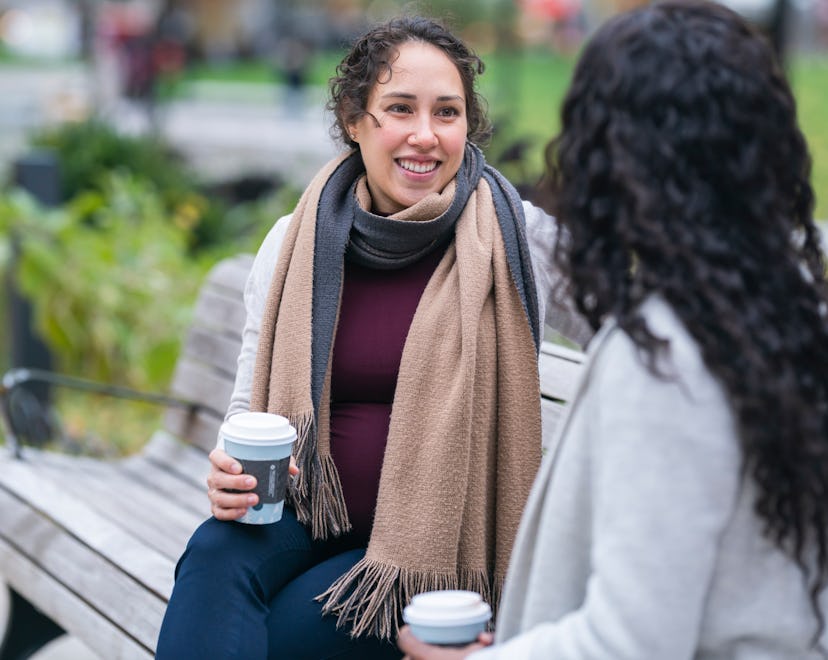Pregnancy

Here's What The Experts Say About Drinking Decaf Coffee During Pregnancy
Because you really miss that afternoon latte.
If you’re pregnant, you’ve probably been told (hopefully by your doctor and not your barista) that you should limit your caffeine intake. But what about traditional coffee’s less caffeinated cousin — is decaf coffee safe during pregnancy? After all, maybe you’re craving the warmth and the taste of a steaming cup of coffee and not so much the caffeine (okay, that’s a big maybe, but you never know).
“There are no official guidelines on decaf coffee and pregnancy; having said such, I would advise consuming it in moderation,” Dr. Angela Jones, M.D., FACOG (who goes by Dr. Angela) tells Romper. Decaf contains a fraction of the caffeine found in caffeinated coffee — a decaf coffee has about 97% of the caffeine removed, per Healthline — which means it's not without caffeine entirely. You shouldn’t have unlimited amount of decaf coffee for this exact reason.
“Decaf coffee does contain caffeine (around 2 to 15mg per 8 oz cup), but a lot less than a typical 8 oz cup of regular coffee (which can contain upwards of 80-200mg per cup). It is advised to keep caffeine intake to less than 200-300 mg per day when pregnant,” Dr. Lucky Sekhon, fertility specialist and board certified OB/GYN from NYC, tells Romper via email. Dr. Sekhon also mentions that the 200-300 mg of caffeine is a guideline for pregnant people that remains constant in each trimester; so it doesn't matter if you're nine weeks pregnant or nine months, it's best to keep the caffeine under 300 mg (and some studies suggest keeping it under 200 mg to be safe). With that said, you’d have to really double-down on the decaf to go over your limit.
But if you find yourself at that 4 p.m. slump trying to decide between a decaf coffee or a lightly caffeinated tea (white tea is typically lowest in caffeine, per Garfield Medical Center, followed by green) it's probably best to reach for the decaf cup of joe. "Most teas' caffeine content ranges from 35-90 mg, which is much higher than a single cup of decaf coffee," Sekhon says. And while herbal teas are not typically caffeinated at all, some of the herbs in tea are not pregnancy-safe, including, as Dr. Angela tells Romper, fennel, borage, licorice, and motherwort. So when in doubt, decaf is totally safe to drink while pregnant (as long as you haven't already had 13 cups that day which would be unlikely, to put it mildly).
Studies Referenced:
The American College of Obstetricians and Gynecologists. (2010). Moderate Caffeine Consumption During Pregnancy. www.acog.org/clinical/clinical-guidance/committee-opinion/articles/2010/08/moderate-caffeine-consumption-during-pregnancy
Experts:
Dr. Angela Jones, M.D., FACOG
Dr. Lucky Sekhon, M.D., fertility specialist and board certified OB/GYN from NYC
This article was originally published on